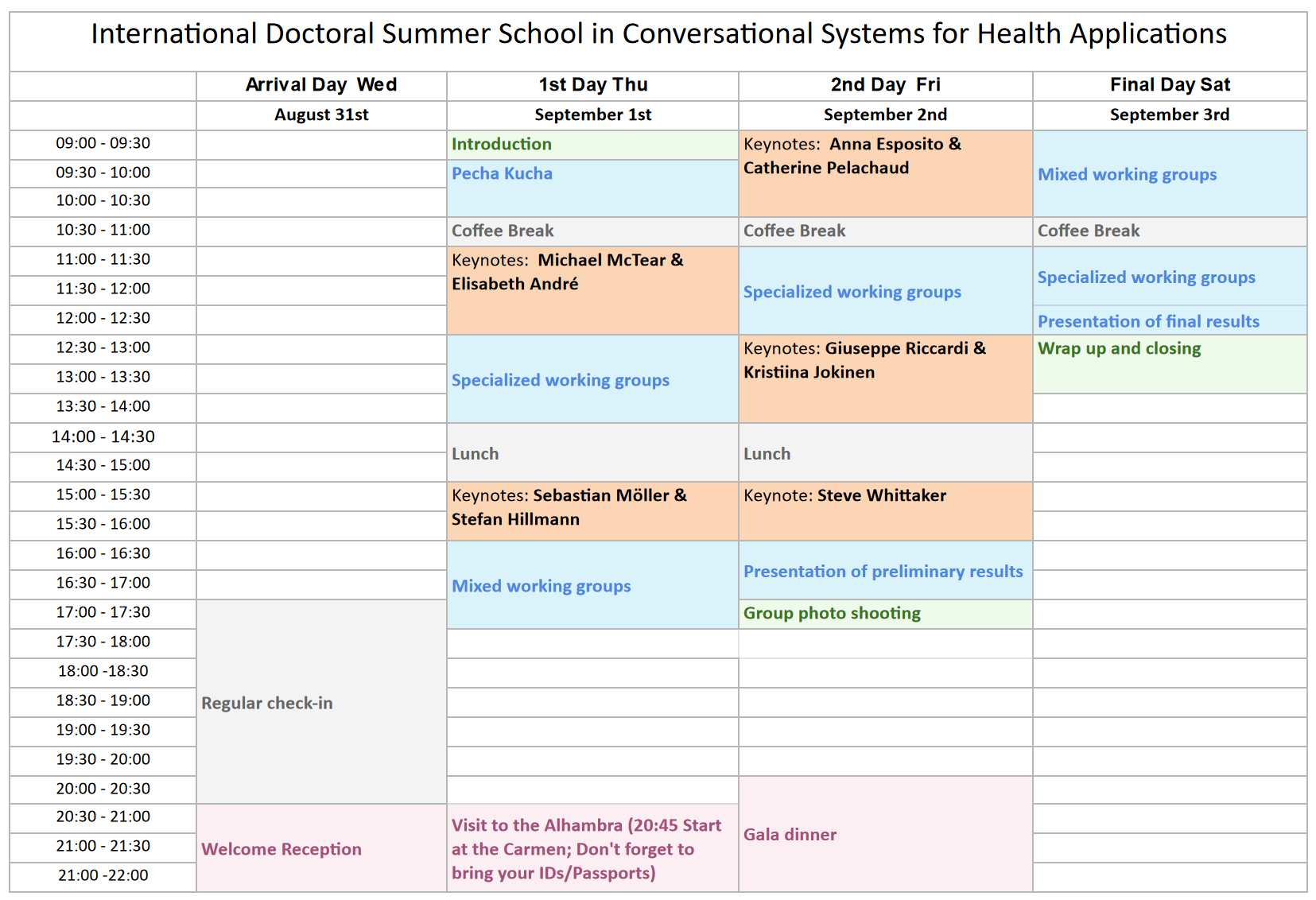Programme
CEST time (Madrid)
Locations
Welcome reception and activities: Carmen de la Victoria https://goo.gl/maps/Bk3Jw21anaKkLEPq7
Gala Dinner (cocktail format): Restaurant of Hotel Vincci Albayzín https://goo.gl/maps/cgkLA4ybrMY6NsYg9

Speakers
Elisabeth André, Chair for Human-Centered Artificial Intelligence, Augsburg University, Germany
Elisabeth André is a full professor of Computer Science and Founding Chair of Human-Centered Artificial Intelligence at Augsburg University in Germany. Elisabeth André has a long track record in multimodal human-machine interaction, embodied conversational agents, social robotics, affective computing and social signal processing. Her work has won many awards including including the ICMI Sustained Accomplishment Award 2021 and the Gottfried Wilhelm Leibnitz Prize 2021 of the German Research Foundation, with 2.5 Mio € the highest endowed German research award. In 2010, Elisabeth André was elected a member of the prestigious Academy of Europe, and the German Academy of Sciences Leopoldina. In 2017, she was elected to the CHI Academy, an honorary group of leaders in the field of Human-Computer Interaction. To honor her achievements in bringing Artificial Intelligence techniques to Human-Computer Interaction, she was awarded a EurAI fellowship (European Coordinating Committee for Artificial Intelligence) in 2013. In 2019, she was named one of the 10 most influential figures in the history of AI in Germany by National Society for Informatics (GI). Since 2019, she is serving as the Editor-in-Chief of IEEE Transactions on Affective Computing.

Anna Esposito, Professor of Computer Science, Università della Campania "Luigi Vanvitelli", Italy
Anna Esposito received her “Laurea” Degree summa cum laude from Salerno University of Salerno with a thesis on Neural Networks published on Complex System, 6(6), 507-517, 1992. She received the PhD degree in Applied Mathematics and Computer Science from Naples University “Federico II”, with a PhD thesis published on Phonetica, 59(4), 197-231, 2002 and developed at MIT, RLE Lab (Boston, USA). Anna has been post doc at the International Institute for Advanced Scientific Studies, and Assistant Professor at Dept of Physics, Salerno University teaching Cybernetics, Neural Networks, and Speech Processing (1996-2000). She held a research professor positon at Wright State University, Dept. of Computer Science and Engineering, OH, USA (2000-2002). Anna has been associate (2003-2019) and is currently (2020 to date) full professor in Computer Science at Università della Campania “L. Vanvitelli” teaching on Cognitive and Algorithmic Issues of Multimodal Communication, Social Networks Dynamics, Cognitive Economy, and Decision Making and directing the Behaving Cognitive Systems laboratory (BeCogSys). Currently the lab is participating to the H2020 projects: a) Empathic, www.empathic-project.eu/ and b) Menhir, menhir-project.eu/ , the Italian projects: c) SIROBOTICS, https://www.grifomultimedia.it/en/portfolio_page/si-robotics-social-robotics-for-active-and-healthy-ageing/ and d) ANDROIDS, https://www.psicologia.unicampania.it/android-project, and the Erasmus project: G-Guidance, https://g-guidance.eu/language/en/. Anna authored 300+ peer reviewed publications and edited/co-edited 32+ international books.

Stefan Hillmann , TU Berlin, Germany
Stefan Hillmann is senior researcher at the Quality and Usability Lab of Technische Universität Berlin and responsible for the research group on Speech and Dialog. He is also guest researcher at the Speech and Language department of the German Research Center for Artificial Intelligence (DFKI). Since 2010 he is working on the measurement and evaluation of the usability and user experience of spoken dialogue systems and chatbots. In 2017, he did his PhD on simulation-based usability evaluation of spoken and multimodal dialogue systems. Since 2018 he focuses on the usage of machine learning for dialogue management and on the standardization of UX-related methods for AI-based conversational systems. His most recently funded projects are on supportive interactive assistants in the educational and health domain. In his research and funded projects, he integrates knowledge on human behaviour, usability engineering methods and AI-based models for interactive systems.

Kristiina Jokinen , Senior Researcher, AI Research Center, AIST, Tokyo Waterfront, Japan; Adjunct Professor, University of Helsinki, Finland
Kristiina Jokinen is Senior Researcher at AI Research Center, AIST Tokyo Waterfront and Adjunct Professor at University of Helsinki. She is Life Member of Clare Hall at University of Cambridge, and Member of the ELLIS network. Her research concerns AI-based dialogue modelling, multimodal communication and human-robot interaction, and she has published widely on these topics, including four books. She developed Constructive Dialogue Model as a general framework for interaction, and led development of WikiTalk, a Wikipedia-based robot dialogue system which won Best Robot Design award (Software Category) at ICSR 2017. She has led numerous national and international research projects, and currently leads a research group at AIST on trustworthy virtual coaching in the EU-Japan collaboration project e-VITA. She is on the steering committee of the
IWSDS dialogue workshop series and was on the advisory board of the H2020 project EMPATHIC. She has served as Chair or Area Chair of such leading conferences as SIGDIAL, COLING, Interspeech, ICMI, IWSDS, ICSR, and IVA.

Michael McTear, Emeritus Professor, Ulster University, Nothern Ireland
Michael McTear is an Emeritus Professor at Ulster University with a special interest in spoken language technologies. He has been researching in the field of spoken dialogue systems for more than 20 years and is the author of several books, including Spoken Dialogue Technology: Toward The Conversational User Interface (Springer, 2004), Spoken Dialogue Systems (Morgan and Claypool, 2010), with Kristiina Jokinen, The Conversational Interface: Talking to Smart Devices (Springer, 2016), with Zoraida Callejas and David Griol, and Conversational AI ( Morgan & Claypool 2020). Michael has delivered keynote addresses and tutorials at many academic conferences and workshops, including SpeechTEK, Conversational Interaction, ProjectVoice, REWORK AI Assistant Summit, and the European Chatbot Conferences. Currently Michael is involved in several research and development projects investigating the use of conversational agents in socially relevant projects such as mental health monitoring, and home monitoring of older persons.

Sebastian Möller , TU Berlin, Germany
Sebastian Möller studied electrical engineering at the universities in Bochum (Germany), Orléans (France), and Bologna (Italy). From 1994 to 2005, he was a scientific researcher and later lecturer at the Institute of Communication Acoustics at Ruhr Universität Bochum specializing in speech transmission, speech technology, and communication acoustics, as well as the quality of speech-based systems. Möller earned his habilitation at the Faculty of Electrical Engineering and Information Technology at Ruhr Universität Bochum in 2004 with a book discussing the quality of telephone-based speech dialog systems. He joined Telekom Innovation Laboratories (previously known as Deutsche Telekom Laboratories) in June 2005. In April 2007, he was appointed to a professorship at Technische Universität Berlin, and at Telekom Innovation Laboratories he was the head of the Quality and Usability Lab. From 2015 to 2017, he served as a Vice Dean for Research at the Faculty for Electrical Engineering and Computer Science at Technische Universität Berlin, and from 2017 to 2019 as the Dean of this faculty. He also leads the research department Speech and Language Technology at the German Research Center for Artificial Intelligence, DFKI, as a Scientific Director since 2017. In September 2008, Möller was a visiting fellow at the Marcs Institute (formerly Laboratories), University of Western Sydney in Australia, specializing in the evaluation of avatars. In November 2011, he was Visiting Professor at the Universidad de Granada (Spain), from February to April 2012, and from May to July 2014 Visiting Professor at the Ben Gurion University of the Negev in Be'er Sheva (Israel), in October 2013 Visiting Professor at NTNU in Trondheim (Norway), from 2012 to 2018 he was Adjunct Professor at the University of Canberra (Australia), and since 2018, he is Adjunct Professor at the University of Technology Sydney (Australia). His book on "Quality Engineering" was published in 2010.

Catherine Pelachaud, Director of Research CNRS at Institut des Systémes Intelligents et de Robotique, Sorbonne Université, France
Catherine Pelachaud (CNRS-ISIR) is Director of Research in the laboratory ISIR, Sorbonne University. Her research interest includes socially interactive agent, nonverbal communication (face, gaze, gesture and touch), and multi-party interaction. With her research team, she has been developing an interactive virtual agent platform, Greta, that can display emotional and communicative behaviors. She is co-editor of the ACM handbook on socially interactive agents (2021).

Giuseppe Riccardi, Professor of Computer Science, University of Trento, Italy
Giuseppe Riccardi is founder and director of the Signals and Interactive Systems Lab at the University of Trento, Italy. He received the MSEE and PhD in Electrical Engineering from the University of Padua (Italy), From 1993 to 2005, he was at AT&T Bell Laboratories (USA) and then AT&T Labs-Research (USA) in the Speech and Language Processing Research Division. In 2005 joined the Department of Information Engineering and Computer Science at the University of Trento (Italy). He is elected Fellow of IEEE (2010) and of ISCA (2017). Giuseppe's research focuses on conversational artificial intelligence: computational models for natural language processing, human-machine dialogue and affect processing. At AT&T he and his colleagues designed, trained and deployed “ How May I Help You ? “, the first large scale natural language human-machine dialogue system in the late-nineties. His research is now aiming at creating human-machine interaction and conversational systems that can benefit individuals, their wellbeing and their health.

Steve Whittaker , University of California at Santa Cruz, USA
Steve Whittaker is Professor of Human Computer Interaction at University of California at Santa Cruz. Probably best known for his work on computer mediated communication, he uses social science approaches to design novel interactive systems to support memory, collaboration and personal information management. He received a Lifetime Research Achievement Award from SIGCHI (Special Interest Group on Computer Human Interaction), is a Member of the SIGCHI Academy and a Fellow of the Association for Computational Machinery (ACM). He has also received a Lasting Impact Award from ACM Computer Supported Co-operative Work (CSCW), and been nominated for, or awarded 10 Best Paper awards at ACM CHI, CSCW and IUI conferences. He is Editor of the journal Human Computer Interaction. His current interests are designing human-understandable AI and computational well-being. His most recent book with Ofer Bergman is The Science of Managing Our Digital Stuff, from MIT Press.
ORGANIZERS

Organized by the H2020 MENHIR Project. This project has received funding from the European Union's Horizon 2020 research and innovation programme under grant agreement no. 823907.
With the collaboration of the Spanish Bon-App-petit research project (P18-RT-4550). Entidad financiadora: Plan Andaluz de Investigación, Desarrollo e Innovación (PAIDI 2020). Proyectos de investigación orientados a los retos de la sociedad andaluza.
Organizing committee
Matthias Kraus, Ulm University, Germany
Nicolas Wagner, Ulm University, Germany
Zoraida Callejas, University of Granada, Spain
David Griol, University of Granada, Spain
Wolfgang Minker, Ulm University, Germany
